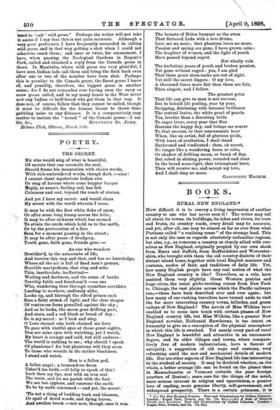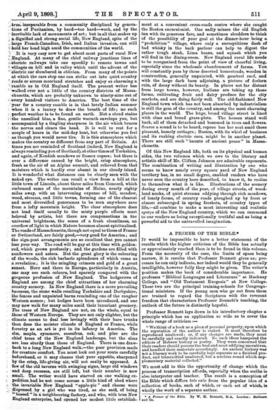BOOKS.
RURAL NEW ENGLAND.*
How difficult it is to convey a living impression of another country to one who has never seen it ! The writer may tell all about its towns, its buildings, its lakes and rivers, its trees and fruits, its country roads, every detail may be accurate, and yet, after all, one may be almost as far as ever from what Puritans called "a realising sense" of the strange land. This is not only the case as regards absolutely unfamiliar regions, but also, e.g., as concerns a country so closely allied with our- selves as New England, originally peopled by our own stock from Essex and Suffolk, from Bedfordshire and Worcester- shire, who brought with them the old country dialects of their distant island home, together with local English manners and customs, modes of faith and traditions of daily life. Yet, how many English people have any real notion of what the New England country is like? Travellers, as a rule, have assisted them very slightly. Great Western prairies and huge cities, the usual globe-trotting routes from New York to Chicago, the vast plains across which the Pacific railways run,—these have been described over and over again ; but how many of our rushing travellers have turned aside to visit the far more interesting country towns, hillsides, and green valleys of New England ? The novels of Miss Wilkins have enabled us to come into touch with certain phases of New England country life, but Miss Wilkins, like a greater New England novelist, Nathaniel Hawthorne, is too intent on humanity to give us a conception of the physical atmosphere in which this life is swathed. Yet nearly every part of rani New England is beautiful and attractive in an uncommon degree, and its older villages and towns, where compara- tively free of modern industrialism, have a flavour of antiquity, a suggestion of old ways and customs, very refreshing amid the new and mechanical details of modern life. Nor are other aspects of New England life less interesting to the student of society. It may be doubted whether, on the whole, a better average life can be found on the planet than in Massachusetts or . Vermont (outside the poor foreign quarters of Boston) ; more care for the things of the mind, more serious interest in religion and speculation, a greater love of reading, more genuine liberty, self-government, and widespread prosperity. There is a certain primness, it is • ill The New Rengland Country. Text and Illustrations by Clifton Johnson. London ; Keg= Paul, Trench, and Co. 176. 6d.)—(2.) A Book of Consery Clouds and Sunshine. Text and Illustrations by Clifton Johnson. London; Kogan Paul, Trench, and Co. 1711. 6d.1
.true, inseparable from a community disciplined by genera- tions of Puritanism, by hard—too hard—work, and by the inevitable lack of monuments of art ; but in all that makes up , a dignified and strong social life, New England, spite of the large French-Canadian, Irish, and Italian invasion, can still S hold her head high amid the communities of the world.
't It is very easy now to get about most parts of rural New England. At many of the chief railway junctions lines of electric railways take one speedily to remote towns and villages on hill and in valley which until the advent of the electric car slumbered in oblivion. From many of the points at which the cars atop one can strike out into quiet country - roads or across moorland stretches and enjoy as charming a ramble as in Old England itself. The present writer has walked over not a little of the country districts of Massa- chusetts, which are probably unknown to ninety-nine out of ( 'every hundred visitors to America. The best time of the . year for a country ramble is in that lovely India!). summer when it is a luxury to draw the breath of life ; no such perfect weather is to be found on earth. Not a cloud stains -the unsullied blue, a fine, gentle warmth envelops you, but .• accompanied by a tingling sharpness in the air which braces the nerves and clears the head. It is well to rest for a c,ouple of hours in the mid-day heat, but otherwise you feel as though you would never tire. It is this atmosphere which makes the country so different from any part of Britain. At times you are reminded of Scotland (indeed, New England is always reminding you of Scotland), at other times of Yorkshire, and again, of Kentish meadows or Sussex copses; but there is ever a difference caused by the bright, crisp atmosphere, fresh as the air of an Alpine summit, and relieved from that moisture which is hardly ever absent in our cloudy island. It is wonderful what distances can be clearly seen with the naked eye. The writer can recall a view from a hill at the little town of Lincoln, about three miles from Concord, which embraced some of the mountains of Maine, nearly eighty miles away, with an intervening expanse of hill, meadow, wood, streams, and little towns, forming one of the clearest and most diversified panoramas to be seen anywhere save from a lofty mountain height. The clear atmosphere does net lend itself usually to the misty purple effects most beloved by artists, but there are compensations in the universal brightness, the sense of a fresh cleanliness, an overflow of light in which Nature becomes almost spiritnalised. The roads of Massachusetts, though not equal to those of France or Switzerland, are fairly good,—very good for America; and the sign-post arrangements are so excellent that you cannot lose your way. The road will be gay at this time with golden- rod, which grows profusely ; and the gardens are filled with sunflowers and asters. But the great glory is the colouring of the woods, the rich barbaric splendours of which come as a revelation; it is the mingling crimson and gold of a great sunset. Here and there in Europe, particularly in Austria, one may see such colours, but sparsely compared with the gorgeous profusion of New England. The hedgerows of England are among the chief attractions of her charming country scenery. In New England there is a more prevailing bareness, the stone walls recalling Yorkshire and Derbyshire, the fences and unpainted barns reminding one of the rougher Western scenes ; but hedges have been introduced, and one may now walk for many miles amid their luxuriant greenery. The trees of New England are not, on the whole, equal to those of Western Europe. They are not only slighter, but the climate seems to deal less lovingly with their bare trunks than does the moister climate of England or France, while forestry as an art is yet in its infancy in America. The elm, maple, sycamore, sassafras, oak, and pine are the chief trees of the New England landscape, but the elms are less sturdy than those of England. There is one draw- back to a long New England walk,—the poor provision made for creature comfort. You must look out your route carefully beforehand, or it may chance that your appetite, sharpened by the crisp, life-giving air, will not easily be appeased. A few of the old taverns with swinging signs, large old windows
• and deep recesses, axe still left, but their number is now small. The writer would have starved on one walking ex- pedition had he not come across a little kind of shed where • the invariable New England "apple-pie" and cheese were dispensed by a girl who was tired, as she said, of being "bossed" in a neighbouring factory, and who, with true New England enterprise, had opened her modest little establish- ment at a convenient cross-roads centre where she caught the Boston excursionist. One sadly misses the old English inn with its generous fare, and sometimes shudders be think of the possibility of your goal at the dinner-hour being a "prohibition" village, where only a surreptitious dash of bad whisky in the back parlour can help to digest the rather tough steak, Lima beans, and squash which you will find in the dining-room. New England rural life needs to be reorganised from the point of view of cheerful living, especially since the wholesale abandonment of farms. You will constantly pass by these deserted homesteads, wooden in construction, generally unpainted, with gambrel roof, and with the large dark barn adjoining, a picture of forlorn ruin, of decay without its beauty. In places not far distant from large towns, however, Italians are taking up these farms, cultivating fruit and dairy produce for the city markets, and are doing fairly well. The old-fashioned New England town which has not been absorbed by industrialism is still the gem of the country, and among the most charming places in the world. The huge, broad village street is lined with elms and broad grass-plots. The houses stand well back, all of them detached and bosomed in trees and flowers. Scarce a sound is to be heard, repose has her seat amid these pleasant, homely cottages ; Boston, with its whirl of business and its rushing electric cars, might be in another planet. There are still such "haunts of ancient peace" in Massa- chusetts.
Of this New England life, both on its physical and human sides, the two volumes which we owe to the literary and artistic skill of Mr. Clifton Johnson are admirable exponents. The combination of writing and illustration by one who seems to know nearly every square yard of New England territory has, in no small degree, enabled readers who have never seen the country here described, to know it, to realise to themselves what it is like. Elustrations of the scenery during every month of the year, of village streets, of wood- land nooks, of quiet streams eddying through rich meadows, of lonely farms, of country roads ploughed up by frost or almost submerged in spring freshets, of country types of life,—all combine to make a most interesting and realistic aperm of the New England country, which we can commend to our readers as being exceptionally truthful and as being a powerful aid to the untravelled imagination.



































 Previous page
Previous page